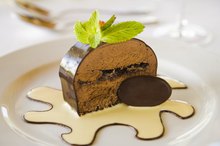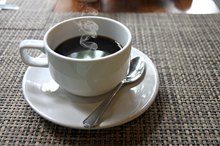What does fact checked mean?
At Healthfully, we strive to deliver objective content that is accurate and up-to-date. Our team periodically reviews articles in order to ensure content quality. The sources cited below consist of evidence from peer-reviewed journals, prominent medical organizations, academic associations, and government data.
- MedlinePlus: Caffeine
- MedlinePlus: Dehydration
- U.S. Food and Drug Administration: Medicines in My Home: Caffeine and Your Body
- Pharmacology, Biochemistry and Behavior: L-theanine Partially Counteracts Caffeine-Induced Sleep Disturbances in Rats
- Pharmacology, Biochemistry and Behavior: L-theanine Partially Counteracts Caffeine-Induced Sleep Disturbances in Rats
The information contained on this site is for informational purposes only, and should not be used as a substitute for the advice of a professional health care provider. Please check with the appropriate physician regarding health questions and concerns. Although we strive to deliver accurate and up-to-date information, no guarantee to that effect is made.
Can You Counteract the Effects of Caffeine?
Getting too much caffeine can make you jittery, give you a headache and make it hard for you to fall asleep 5. The only way to totally get rid of the effects excessive caffeine can have on your body is to wait until it works its way out of your system in about four to six hours 5. However, you may be able to limit some of these effects by drinking water or tea and meditating.
Effects of Water
Caffeine can act as a diuretic, especially if you get a lot more than you're used to and from sources other than beverages 5. This could make you a little dehydrated and lead to a headache. In this case, drinking water might help you get rid of your headache and any other dehydration symptoms you're experiencing 2. However, drinking a large amount of water doesn't flush the caffeine out of your system 5.
Forget the Banana
What Causes a Person to Crash After Drinking Caffeine?
Learn More
Although some people recommend a banana for counteracting the effects of caffeine, the science just doesn't back this up, according to Dr. Randy Eichner in a March 2013 article published on the NPR website 5. The idea is that caffeine makes you dehydrated and low in potassium, so the potassium in the banana will help remedy the symptoms you're experiencing 5. You'd have to get a very large dose of caffeine for it to have an effect on your potassium levels and, even then, one banana doesn't have enough potassium to make much of a difference in your potassium levels 5.
Consider Tea
Preliminary research suggests that a chemical in tea, called L-theanine, may help counteract some of the issues with sleep caused by overconsuming caffeine 5. A study using rats published in "Pharmacology, Biochemistry and Behavior" in April 2012 found that L-theanine may help decrease disturbances in short-wave sleep due to caffeine 56. Further studies are necessary to see if this chemical helps people as well as animals and what dose would be necessary. In the meantime, it wouldn't hurt to drink a cup of decaffeinated tea.
Try Meditating
Why Does Caffeine Give Me a Headache?
Learn More
Being still and participating in activities like meditation and yoga may help you calm down and get over that jittery feeling from too much caffeine 5. Both of these activities help with relaxation. Meditation may also decrease your heartbeat and blood pressure, both of which can be affected by excessive caffeine consumption 5.
Related Articles
References
- MedlinePlus: Caffeine
- MedlinePlus: Dehydration
- NPR: Sorry, But Bananas Won't Calm Your Caffeine Jitters
- Daily Mail: How Much Water Do You Need?
- CNN: Caffeine
- Pharmacology, Biochemistry and Behavior: L-theanine Partially Counteracts Caffeine-Induced Sleep Disturbances in Rats
- Drugs.com: What Do I Need to Know About Relaxation and Meditation?
- Meredith SE, Juliano LM, Hughes JR, Griffiths RR. Caffeine Use Disorder: A Comprehensive Review and Research Agenda. J Caffeine Res. 2013;3(3):114-130. doi:10.1089/jcr.2013.0016
- Richards G, Smith AP. A Review of Energy Drinks and Mental Health, with a Focus on Stress, Anxiety, and Depression. J Caffeine Res. 2016;6(2):49-63. doi:10.1089/jcr.2015.0033
- Brunyé TT, Mahoney CR, Rapp DN, Ditman T, Taylor HA. Caffeine enhances real-world language processing: evidence from a proofreading task. J Exp Psychol Appl. 2012;18(1):95-108. doi:10.1037/a0025851
- Koppelstaetter F, Poeppel TD, Siedentopf CM, et al. Caffeine and cognition in functional magnetic resonance imaging. J Alzheimers Dis. 2010;20 Suppl 1:S71-84. doi:10.3233/JAD-2010-1417
- Harrell PT, Juliano LM. Caffeine expectancies influence the subjective and behavioral effects of caffeine. Psychopharmacology (Berl). 2009;207(2):335-42. doi:10.1007/s00213-009-1658-5
- Lucas M, O'reilly EJ, Pan A, et al. Coffee, caffeine, and risk of completed suicide: results from three prospective cohorts of American adults. World J Biol Psychiatry. 2014;15(5):377-86. doi:10.3109/15622975.2013.795243
- Abdel-Hady H, Nasef N, Shabaan AE, Nour I. Caffeine therapy in preterm infants. World J Clin Pediatr. 2015;4(4):81-93. doi:10.5409/wjcp.v4.i4.81
- American Psychiatric Association. Diagnostic and Statistical Manual of Mental Disorders. 5th edition. Washington DC; 2013.
- Turnbull D, Rodricks JV, Mariano GF, Chowdhury F. Caffeine and cardiovascular health. Regul Toxicol Pharmacol. 2017;89:165-185. doi:10.1016/j.yrtph.2017.07.025
- Centers for Disease Control and Prevention. Alcohol and Caffeine. Updated October 23, 2018.
- Alsunni AA. Energy Drink Consumption: Beneficial and Adverse Health Effects. Int J Health Sci (Qassim). 2015;9(4):468-474.
- Lyngsø J, Ramlau-Hansen CH, Bay B, Ingerslev HJ, Hulman A, Kesmodel US. Association between coffee or caffeine consumption and fecundity and fertility: a systematic review and dose-response meta-analysis. Clin Epidemiol. 2017;9:699-719. doi:10.2147/CLEP.S146496
- U.S. Food and Drug Administration. Pure and Highly Concentrated Caffeine. Updated September 21, 2018.
- National Institute on Drug Abuse. Drugs, Brains, and Behavior: The Science of Addiction. Updated July 2018.
Writer Bio
Based in Massachusetts, Jessica Bruso has been writing since 2008. She holds a master of science degree in food policy and applied nutrition and a bachelor of arts degree in international relations, both from Tufts University.









